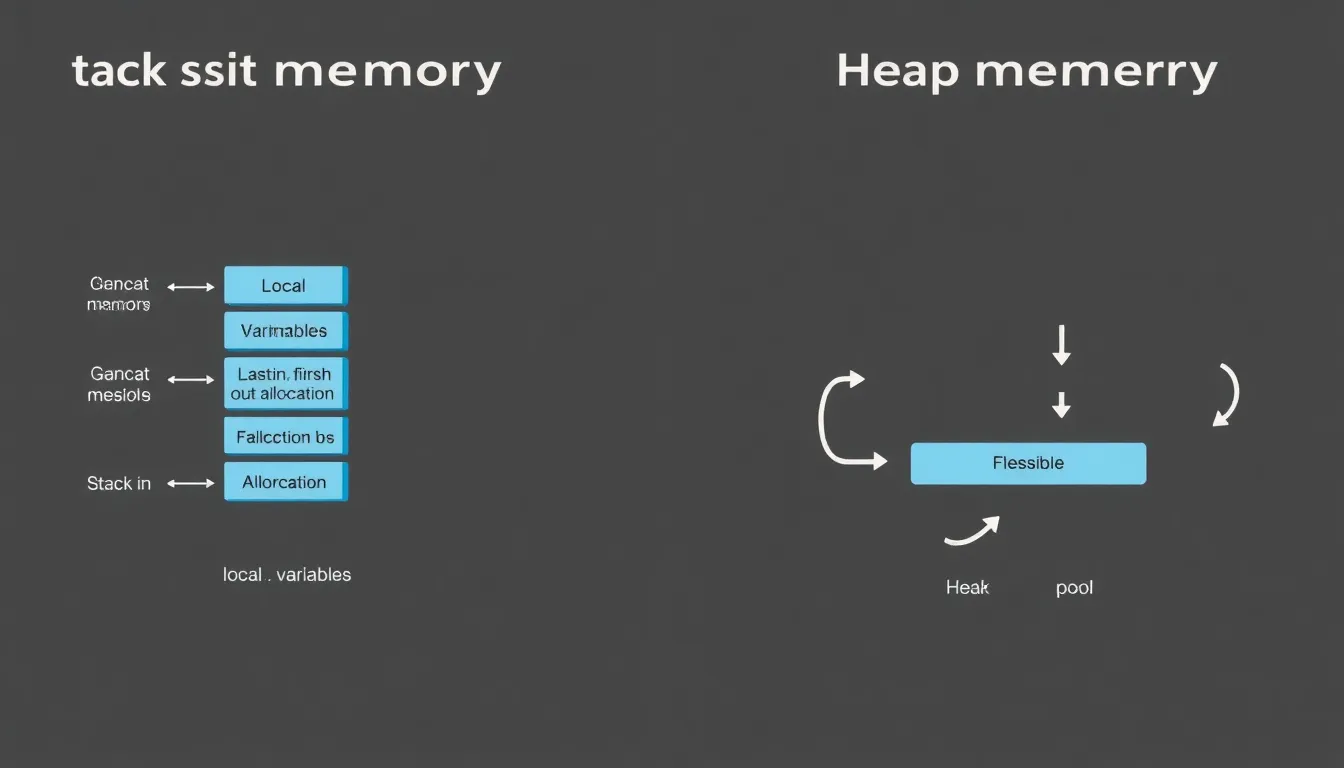C++ memory management is a critical aspect of programming that can make or break an application’s performance. Unlike languages with automatic garbage collection, C++ gives developers direct control over memory allocation and deallocation. This power comes with responsibility, as improper handling can lead to memory leaks, fragmentation, and crashes.
Understanding the intricacies of C++ memory management is essential for creating efficient, reliable software. Mastering concepts like dynamic memory allocation, smart pointers, and RAII (Resource Acquisition Is Initialization) can significantly enhance a developer’s skill set. By delving into these topics, programmers can optimize their applications and ensure they run smoothly in a resource-constrained environment.
Overview Of C++ Memory Management
C++ memory management involves manual allocation and deallocation of memory using operators and classes. Developers control memory through the use of keywords such as new and delete for dynamic memory allocation. This process allows for the creation of data structures that can grow or shrink during runtime, offering flexibility in resource usage.
Dynamic memory allocation is crucial for managing large datasets or complex data structures. It enables developers to request memory from the heap, contrasting with stack allocation where memory size is fixed at compile time. Proper handling of dynamic memory, however, requires vigilance to prevent memory leaks—occurrences where allocated memory is not freed.
Smart pointers enhance memory management by automating resource management. C++ provides several types of smart pointers, including:
- std::unique_ptr: Represents exclusive ownership of a resource, automatically deallocating memory when it goes out of scope.
- std::shared_ptr: Allows multiple pointers to share ownership of the same resource, utilizing reference counting to manage resource lifespan.
- std::weak_ptr: Works alongside
std::shared_ptr, preventing cyclic dependencies by holding a non-owning reference to the resource.
RAII (Resource Acquisition Is Initialization) embodies a programming idiom where resource allocation is tied to object lifetime, simplifying resource management. This practice aids in constructing robust applications, as resources are automatically released when objects fall out of scope.
Understanding these concepts promotes effective C++ programming, enhancing application performance and stability. Mastery of memory management enables developers to leverage C++’s capabilities while mitigating potential pitfalls.
Types Of Memory In C++

C++ utilizes various memory types, each serving distinct purposes in programming. Understanding these types is essential for effective memory management.
Stack Memory
Stack memory allocates space in a last-in, first-out (LIFO) manner. It stores local variables and function call information. The lifetime of stack memory is tied to the function’s execution. When a function returns, its stack memory is automatically reclaimed. This automatic memory management enhances performance, avoiding memory leaks. Stack memory is limited in size, resulting in potential overflow if large data is allocated.
Heap Memory
Heap memory provides dynamic memory allocation during program execution. Developers manually allocate and free this memory using the new and delete operators. Heap memory supports the creation of complex data structures, such as linked lists and trees, that require dynamic sizing. However, this flexibility necessitates careful management to prevent memory leaks and fragmentation. Unlike stack memory, heap memory persists until explicitly deallocated.
Dynamic Memory Allocation
Dynamic memory allocation in C++ provides the essential capability to allocate memory at runtime, allowing for flexibility when dealing with variable-sized data structures. Proper usage of dynamic memory significantly enhances application capabilities but demands meticulous management to avoid pitfalls.
Using New And Delete
C++ developers utilize the new keyword for dynamic memory allocation. This operator allocates memory on the heap and returns a pointer to it. For example, a developer can allocate an array of integers using:
int* arr = new int[10];
Upon completion of use, the memory must be reclaimed using the delete keyword. Failing to deallocate memory leads to memory leaks. For instance, to free the previously allocated array, use:
delete[] arr;
Without such precautions, unused memory accumulates, degrading performance and potentially causing the program to exhaust available memory.
Smart Pointers In C++
Smart pointers provide a modern approach to handle dynamic memory safely. C++11 introduced several types of smart pointers, including std::unique_ptr, std::shared_ptr, and std::weak_ptr, which automate memory management and reduce the risk of memory leaks.
std::unique_ptr: Represents sole ownership of an object through a pointer. It deallocates memory when the pointer goes out of scope. Example:
std::unique_ptr<int> ptr(new int(5));
std::shared_ptr: Allows multiple pointers to share ownership of an object. It uses reference counting to free memory when the last pointer is out of scope. Example:
std::shared_ptr<int> ptr1(new int(10));
std::shared_ptr<int> ptr2 = ptr1; // Both share ownership
std::weak_ptr: Provides a non-owning reference to an object managed bystd::shared_ptr, preventing circular references. Example:
std::weak_ptr<int> weakPtr = ptr1;
Incorporating smart pointers simplifies C++ memory management, enhancing application reliability and performance while minimizing the potential for common errors associated with raw pointer usage.
Common Memory Management Issues
C++ programmers often face several memory management challenges that can lead to inefficient applications or application crashes. Understanding these issues is crucial for maintaining robust and efficient software.
Memory Leaks
Memory leaks occur when dynamically allocated memory is not properly deallocated. Such leaks accumulate over time, consuming available memory and eventually causing the program to slow down or crash. Example sources of memory leaks include forgetting to call delete after using new or failing to release resources within exception handling blocks. Tools like Valgrind can help developers identify and address memory leaks effectively, ensuring optimal application performance and resource utilization.
Dangling Pointers
Dangling pointers arise when a pointer refers to a memory location that has been deallocated. Accessing such pointers leads to undefined behavior, which can result in crashes or data corruption. Common scenarios include deleting an object but still using its pointer or returning a pointer to a local variable that goes out of scope. Using smart pointers, such as std::unique_ptr and std::shared_ptr, mitigates the risk of dangling pointers by automatically managing resource lifetimes, thereby enhancing program stability and safety.
Best Practices For C++ Memory Management
Managing memory effectively in C++ requires several best practices to ensure efficiency, safety, and performance. Embracing these strategies helps developers avoid common pitfalls associated with memory management.
Use Smart Pointers
- Utilize std::unique_ptr: This smart pointer takes ownership of a dynamically allocated object, ensuring automatic deallocation when it goes out of scope.
- Employ std::shared_ptr: Use this smart pointer for shared ownership of an object. It allows multiple pointers to reference the same object, deallocating memory when the last shared pointer is destroyed.
- Integrate std::weak_ptr: This smart pointer serves as a companion to std::shared_ptr, preventing circular references by not affecting the reference count.
Adopt RAII Principle
- Bind Resource Lifetime: Tie resource acquisition to object lifetime, ensuring that resources are released when objects go out of scope.
- Encapsulate Resources: Wrap resources like file handles or network connections within classes, allowing for automatic cleanup.
Conduct Regular Memory Leak Testing
- Use Tools like Valgrind: Employ memory analysis tools to regularly check for memory leaks and improper memory usage. This helps identify and fix issues early in the development process.
- Analyze Code for Potential Leaks: Implement static analysis tools that scan code for memory management errors, improving code quality.
Avoid Raw Pointers
- Limit Usage of raw pointers: Prefer smart pointers over raw pointers to reduce the risk of memory leaks and dangling pointers.
- Implement Ownership Semantics: Define clear ownership of resources to avoid confusion and ensure appropriate memory management.
Handle Exceptions Properly
- Implement Exception Safety: Ensure that allocation and deallocation handle exceptions gracefully, preventing memory leaks during error occurrences. RAII naturally supports exception safety by releasing resources in destructors.
Minimize Dynamic Memory Allocation
- Prefer Stack Allocation: Use stack memory for simple, temporary objects whenever possible. Stack allocation is faster and automatically handled by the compiler, reducing overhead.
- Preallocate Memory: If dynamic memory allocation is required, consider preallocating memory using containers like std::vector. This reduces fragmentation and improves performance.
Monitor Memory Performance
- Profile Memory Usage: Regularly monitor memory consumption during execution to identify potential bottlenecks and optimize memory allocation patterns.
- Use Allocation Strategies: Design specific allocation strategies tailored to the needs of the application, balancing speed and memory footprint.
Implementing these best practices enhances memory management in C++, ensuring efficient and reliable applications while mitigating the risks associated with manual memory handling.
Mastering C++ memory management is essential for any developer aiming to create efficient and reliable applications. By understanding the intricacies of dynamic memory allocation and utilizing smart pointers, programmers can significantly reduce the risk of memory leaks and crashes.
Embracing best practices like RAII and regular memory leak testing ensures that applications remain robust and performant. As C++ continues to evolve, staying informed about memory management techniques will empower developers to harness the full potential of the language while maintaining high standards of software quality.
